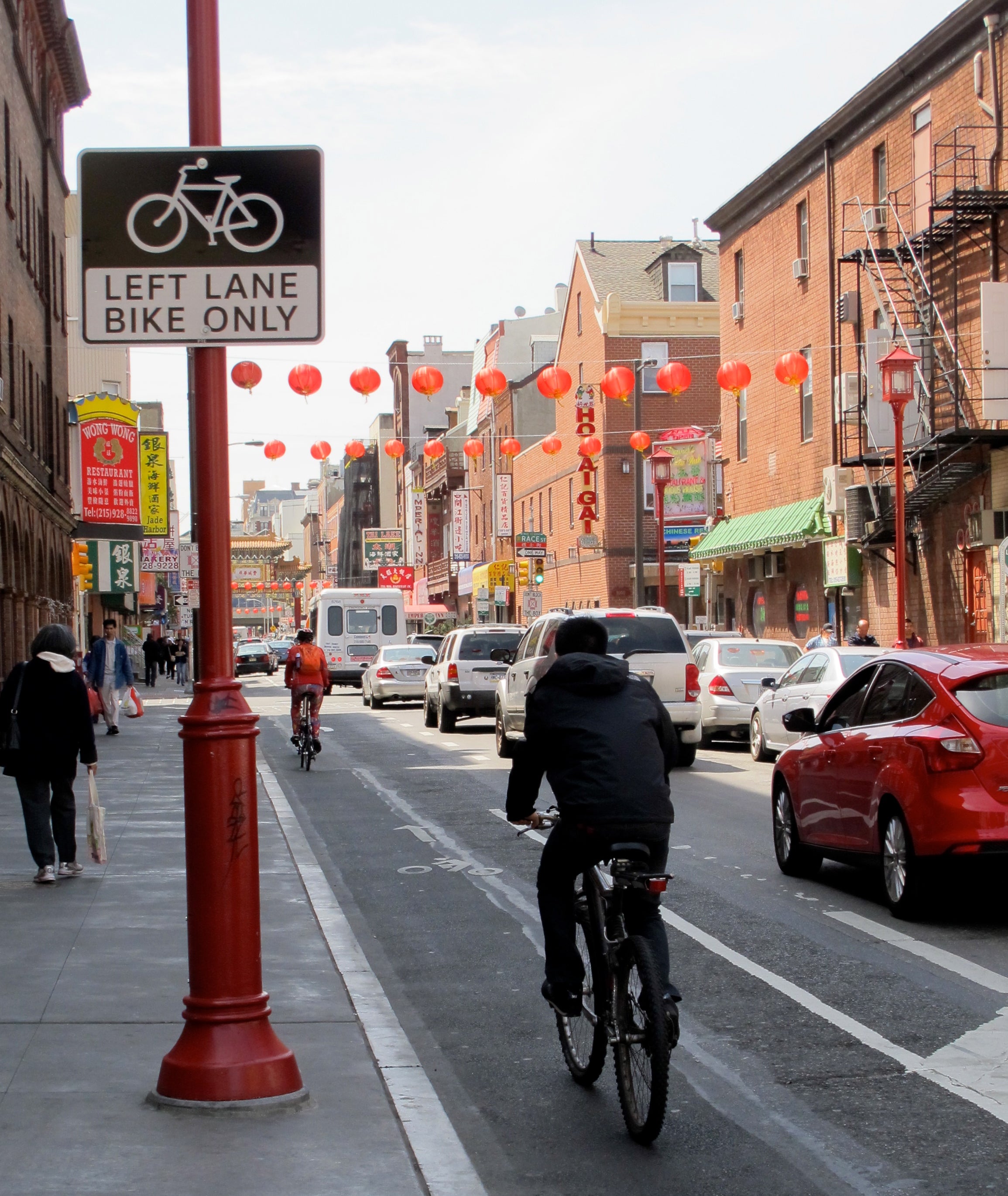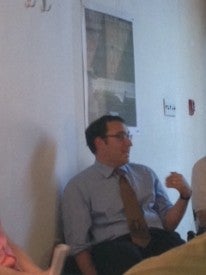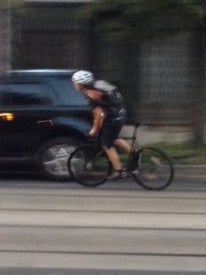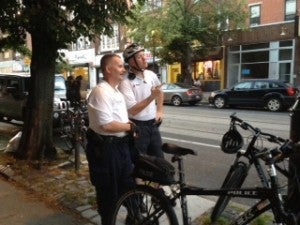Chinatown: The 10th Street bike lane causes concern

This article was created in partnership with Temple University’s capstone journalism course Philadelphia Neighborhoods.
By Alicia DiGiovanni and Mark Lauterbach

Andrew Stober discussed his views on the bike lane.
Bicycles are a trendy, increasingly viable form of transportation, especially with this year’s unstable gas prices.
So many cities have been installing new bike lanes, starting bike share programs and developing complete street policies to make streets safer for cyclists as well as other nondrivers.
The Bicycle Coalition of Greater Philadelphia is a nonprofit advocacy group that works to improve conditions for bicyclists. The coalition and Next Great City organized a meeting recently to discuss the 10th Street bike lane at the Storefront for Urban Innovation on 2816 W. Girard Ave.
A panel of city officials, community members, advocates and researchers lent their interpretation of the impact of cycling in Philadelphia. The panelists included Andrew Stober from the Mayor’s Office of Transportation and Utilities, Alex Doty from the Bicycle Coalition, John Chin from the Chinatown Development Corp. and advocates from Penn Design.
Doty made one of his goals clear at the meeting: “I want to make the streets bike friendly for 8- to 80-year-olds.” He would like to make safer streets a priority for bicyclists. “It is very important to have city wide education on cycling and safety.”
The panelists called the education program for bicyclists “Edu-forcement” and discussed its impact on ensuring safety for bicyclists, pedestrians and motorists. “Once we can get two bikers to stop at a red light, more will. Bikes classify as a vehicle. They have to follow the same rules as a vehicle. That will be the nucleus to form a safer environment,” Officer Michael Brady said.
“People are terrified of being hit by cars,” said Julian Root, an advocate for bicyclists from Penn Design. “Motorists aren’t so bad. I have a much bigger problem with pedestrians. It’s more important to educate pedestrians than motorists.”

Julian Root, bicyclist advocate, road his bike home from the meeting.
The bike lane has yielded some exceptional benefits, reducing crashes by 44 percent and creating a useful emergency lane for ambulances near Jefferson University Hospital.
However, Chinatown residents are not too happy about the idea of a 10th Street bike lane. Members of the Chinatown business community are a little skeptical of a bike lane running through the community. They believe that a bike lane will create more traffic congestion, discourage shoppers who drive in and delay deliveries.
“Chinatown’s a commercial district. One thing that we asked for is an understanding of the impact of a bike lane on our small businesses,” Chin said. “Selecting 10th Street was a head scratcher for many people, including me. It really impacts the people who drive here.”
On the contrary, Stober thinks it is too early to tell if businesses are going to be negatively impacted by the bike lane. He did concede that 10th Street in Chinatown is already busy because of a fire station, loading and unloading trucks, and construction.
The bike lanes that are currently in Chinatown will be made into shared lanes. When 10th Street is repaved shortly, the bike lane will be painted between Ridge and Vine and Market to Lombard.
Eric Law, owner of Asia Crafts, said he thinks the recent compromise can work. “Shared lanes let the cars know that the bikes have a right to be there. The cars can use them when there are no bikes. I feel like that’s a good compromise. I bike too. Having a bike lane in certain areas is nice,” he said.
The concern over bike lanes continues to grow immensely as biking’s popularity expands.
Even though Philadelphia has gained popularity among bicyclists, many residents and visitors still drive everywhere they go.
Stober’s department is still collecting data on traffic and the impact that the bike lane has on small businesses.

Officer Michael Brady talked to his partner about how helpful the bike lanes have been.
“People are looking for cheaper forms of transportation,” Brady said.
“The environment is becoming right to have a bike share program in Philly,” Stober said. Many major employment centers such as University City, Center City and the Navy Yard promote cycling as a primary source of transportation.
The panelists discussed the issue of theft if there were to be a future bike share program. Stober came up with the idea of making the bikes ugly. “Making the bikes come without removable parts can eliminate theft,” he added.
If the bike share program does go through in Philadelphia, tracking devices may even be installed in the bikes to help rule out instances of theft.
All of the panelists agreed that a bike generation is here, especially in Philadelphia. “We can create a place where biking is acceptable and preferable,” Doty said. “We want to make the streets much more durable for bicyclists and motorists, so we have better streets for everyone.”
WHYY is your source for fact-based, in-depth journalism and information. As a nonprofit organization, we rely on financial support from readers like you. Please give today.



